Table of Contents
Question marks are punctuation marks used to show that a sentence is a question. They help readers know that someone is asking something. A question mark (?) is always placed at the end of a question. For example: Where are you going? Using question marks correctly makes writing clear and easy to understand. They are different from periods (.), which end normal sentences, and exclamation points (!), which show strong feelings.
What is a Question Mark (?)
A question mark is a punctuation mark used at the end of a sentence to show that a question is being asked. It helps to signal to the reader that you’re expecting an answer or seeking information.
For example
What time does the movie start?
Are you coming to the party tonight?
Did you finish your homework?
When to Use a Question Mark (?)
You should use a question mark at the end of any direct question. If your sentence is asking something, it should finish with this punctuation. Remember, it’s only used for actual questions, not statements or commands.
- Where did you go last night?
- Can I borrow your book?
- Why is the sky blue?
Question Marks and Quotation Marks
| Rule | Example |
| If the quoted text is a question, the question mark goes inside the quotation marks. | She asked, What time is it? |
| If the entire sentence is a question, but the quoted words are not a question, the question mark goes outside the quotation marks. | Did you hear him say, I will be there soon? |
| When the quoted text itself is a question, the question mark stays inside. | He asked, Do you need help? |
| If the quoted text is a statement, no question mark is needed inside the quotation marks. | He said, I am leaving soon. |

Question Marks and Parentheses
When a question is pushed inside parentheses, the question mark stays inside the parentheses if that part alone is a question. However, if the whole sentence is a question, the question mark will be at the end of the sentence.
- She left early (was something wrong?).
- Are you planning to join us (it’s going to be fun)?
Indirect Questions
Indirect questions don’t need a question mark at all. Indirect questions don’t directly ask for something but rather state that a question exists.
- I wonder if she’s coming.
- He asked whether you would be there.
When a Single Question Mark Falls Short
Sometimes, especially in informal or casual writing, people might use more than one question mark to show surprise, disbelief, or emphasis. However, in formal writing, you should stick to just one question mark.
- Really???
- Why did you do that??
Example Sentences with Question Mark
- What time does the meeting start?
- Are you coming to the party tonight?
- Where did you put my keys?
- Can you help me with my homework?
- Why is the sky blue?
- Did you see the latest movie?
- How do you make pasta?
- When will we get the results?
- Is it going to rain today?
- Who is your favorite author?
Rules for Using a Question Mark
1. Use a question mark for direct questions.
A question mark is required at the end of a direct question, which expects a response.
- What time is the meeting?
- How did you finish the project so quickly?
- Can you help me with this task?
2. Do not use a question mark for indirect questions.
Indirect questions report a question but do not ask it directly. These end with a period, not a question mark.
- She asked if you were coming to the event.
- I wonder when the store opens tomorrow.
- He wants to know why they left early.
3. Place the question mark inside quotation marks when quoting a question.
If a quoted sentence is a question, the question mark goes inside the quotation marks.
- He asked, “Are you coming to the meeting?”
- She said, “Do you need any help with your assignment?”
- I heard him ask, “Where did they go?”
4. If the question is inside parentheses, place the question mark inside.
When a question appears in parentheses, the question mark should be inside if the question is complete.
- He was late (did he forget the time?).
- We need to check the schedule (is it confirmed yet?).
- She seemed confused (was she lost?).
5. Avoid multiple question marks in formal writing.
In casual writing, people sometimes use multiple question marks for emphasis, but formal writing requires only one.
- Did you really finish the project on time?
- How is that even possible?
- Are you coming to the party?
Common Mistakes with Question Mark
Indirect questions report something rather than ask directly, so they should end with a period, not a question mark.
1. Indirect Questions
✔ He asked if you were coming.
✘ He asked if you were coming?
2. Expressing Thoughts
✔ I wonder if she is okay.
✘ I wonder if she is okay?
3. Statements, Not Questions
✔ I think you are going home.
✘ I think you are going home?
4. Confirming Information
✔ You already knew the answer.
✘ You already knew the answer?
FAQs
What does (?) mean?
(?) is often used to indicate uncertainty, confusion, or a placeholder for unknown information in writing.
How do you use (?) In a sentence?
Use (?) at the end of a direct question (e.g., Where are you going?). It can also indicate uncertainty in informal writing (e.g., He was born in 1985 (?))
When to use ?!?
Use ?!? in informal writing to express shock, disbelief, or excitement
(e.g., You did what?!?). Avoid it in formal writing.
5 Examples of Question Mark Sentences
What are you doing?
Where did she go?
Can you help me?
Why is it so cold today?
Did you finish your homework?
You May Also Like

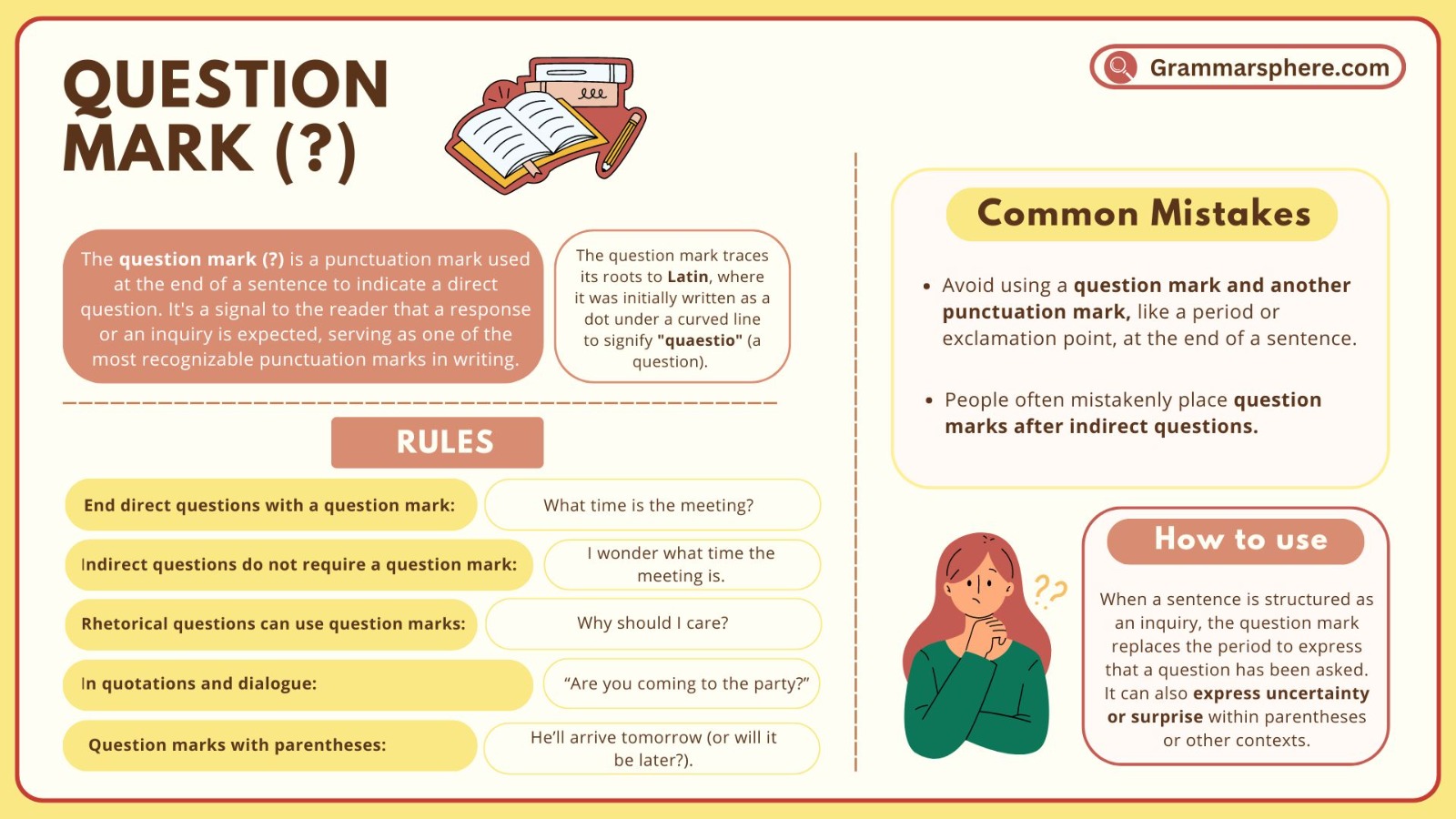
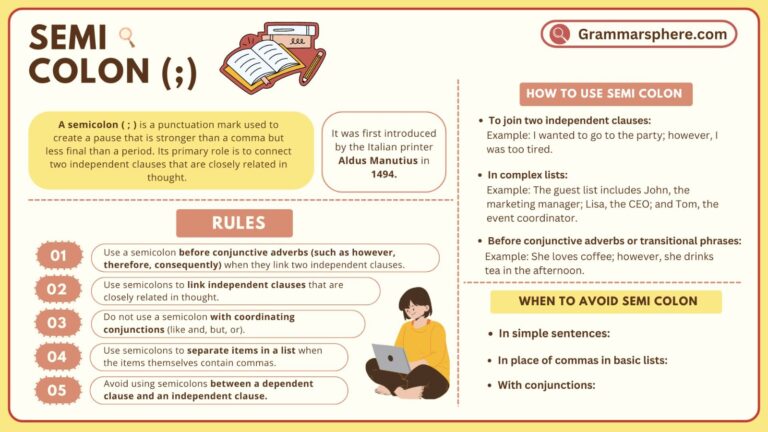
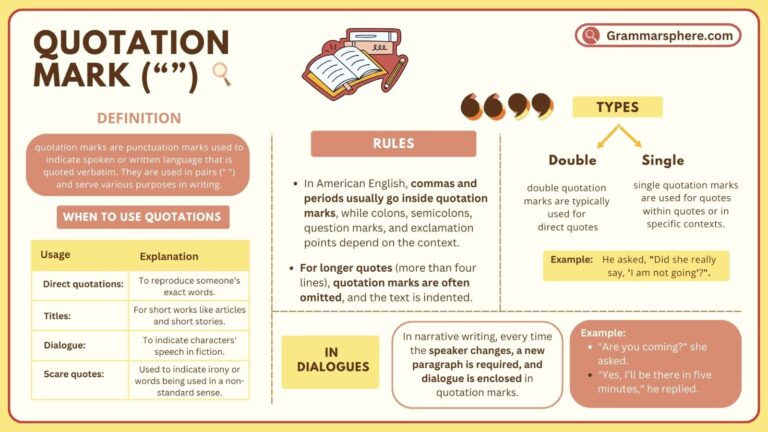
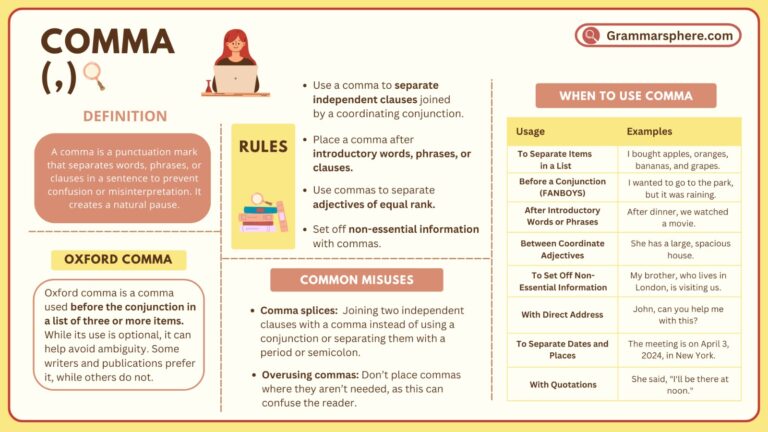
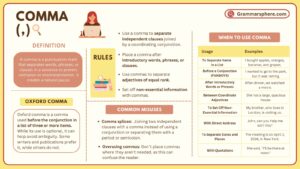
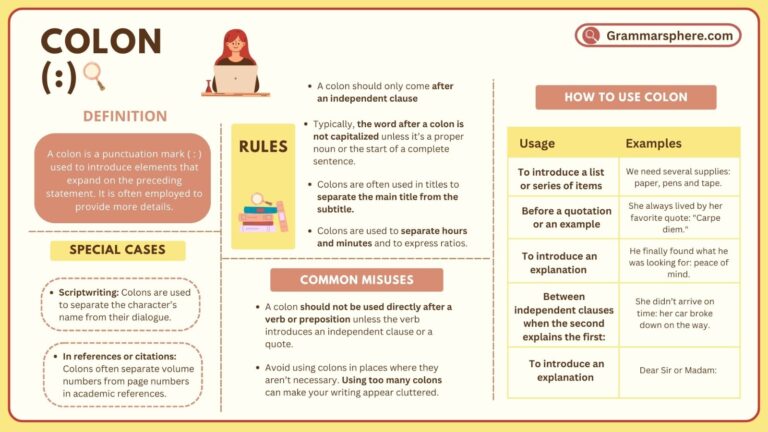
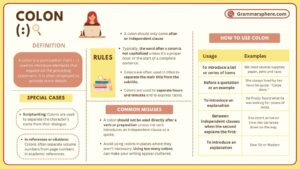
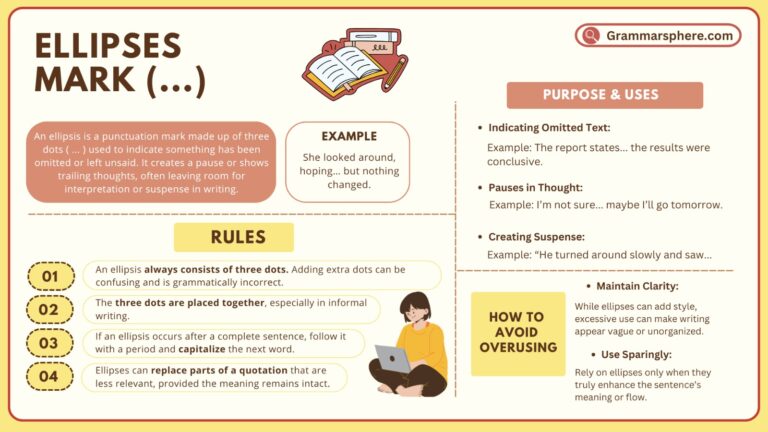
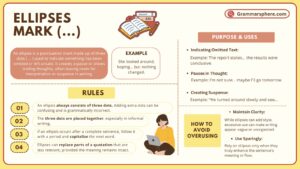
Leave a Comment